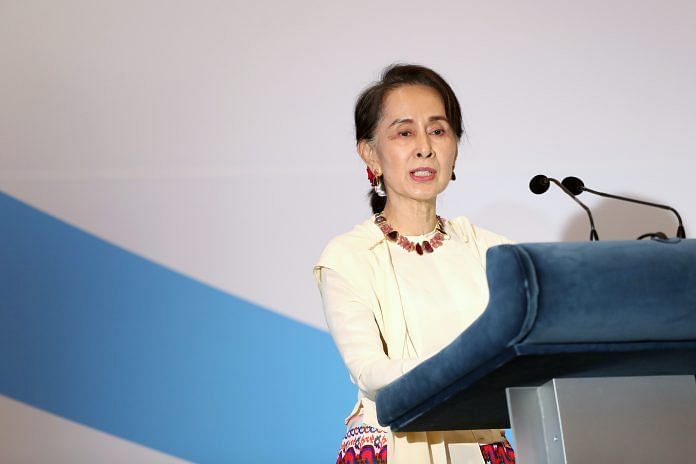New Delhi: Myanmar civilian leader and Nobel Peace Prize winner Aung San Suu Kyi will be present at the International Court of Justice (ICJ) in The Hague from 10-12 December to personally defend her government from allegations of genocide, her office announced.
A lawsuit has been filed by Gambia at the world court alleging that Myanmar has carried out mass murders, rapes and arson against the Rohingyas in the country’s Rakhine state, where the ethnic Muslim minority resides.
The Myanmar military has denied these accusations and said it has only targeted terrorists in Rakhine. It has also rejected the preliminary investigation by the International Criminal Court into these accusations.
Suu Kyi, who has backed her military’s defence, said in an interview last month: “There are certain extremist elements who do not want peace in Rakhine…because for many terrorists, problems are what they thrive on…So we are disappointed…that the international community has paid very little attention to the terrorist element of the problems in Rakhine.”
Also read: Whistleblower, Bidens, Pelosi, Bolton — here’s the cast in Trump impeachment proceedings
What are the allegations against Myanmar
The Myanmar army has been accused of genocide, mass killings, rapes and arson against the Rohingya community. Since 2016, almost three-quarters of a million Rohingyas have fled to Bangladesh following persecution by the country’s military. Investigators of the United Nations have also said the Myanmar army has carried out violence with “genocidal intent”.
A Muslim minority group in Buddhist-dominated Myanmar, the 1.1 million population of Rohingyas taking refuge in Rakhine are not recognised as citizens by the country’s government.
Gambia’s allegation against Myanmar
West African nation Gambia has filed a 46-page application at the ICJ, the principal judicial organ of the United Nations (UN), accusing the Myanmar military of launching “clearance operations” in Rakhine. Gambia’s application states that Myanmar’s military began genocidal acts starting October 2016 after a small number of Rohingyas had reacted to Myanmar’s persecution and attacked three border guard police posts in northern Rakhine state.
During these operations, the submission states, troops had “systematically shot, killed, forcibly disappeared, raped, gang-raped, sexually assaulted, detained, beat and tortured Rohingya civilians, and burned down and destroyed Rohingya homes, mosques, madrassas, shops and Qur’ans”.
Gambia had drafted the application on behalf of the Organisation of Islamic Cooperation (OIC), which includes 57 member states. The application not only calls for those responsible for the genocide to be held culpable but also compensation for victims and an end to attacks.
This case marks the first instance where Myanmar would face legal scrutiny at the ICJ for violating the 1948 UN’s Genocide Convention. According to a report, this is also a rare case where a country is suing another over an issue to which it is not directly a party.
Rohingya activists have welcomed the announcement of the ICJ case, with Nay San Lwin from the Free Rohingya coalition terming it “historic”.
Also read: ‘Hindus aren’t our enemies’ — why final NRC is not what BJP promised and envisioned
No ASEAN backing for Rohingyas
While Gambia has OIC’s backing, its decision to take Myanmar to ICJ is being lauded by countries such as Bangladesh and Canada.
“The aim is to get Myanmar to account for its actions against its own people: the Rohingya. It’s a shame for our generation that we do nothing while genocide is unfolding right under our own eyes,” said Gambia’s Justice Minister Abubacarr Tambadou, at a news conference at The Hague, Netherlands.
In stark contrast, the Association of Southeast Asian Nations (ASEAN), of which Myanmar is a member, has not vehemently spoken against the country’s treatment of the Rohingyas. ASEAN also has Islamic-majority nations such as Indonesia and Malaysia as members. And, even when ASEAN leaders have spoken on the issue, they rarely go beyond their limited national interests.
Aung San Suu Kyi’s tainted image
Suu Kyi’s decision to travel to The Hague to defend her government shows just how far she has travelled from the days when she was an anti-establishment, anti-military icon who fought for equality and human rights.
Myanmar has been under stringent military rule for decades during which Suu Kyi was a prominent civilian leader vouching for equality, human rights and democracy. She had been under house arrest for 15 years for her peaceful opposition to the country’s authoritarian rule.
In 2015, her party, the National League for Democracy (NLD), won a historic majority in the elections which ushered in the first civilian government since 1962. However, it also marked the beginning of Suu Kyi’s tense alliance with the military authority as the country’s state counsellor (a post similar to that of a prime minister).
Her government is currently in an “uneasy power-sharing agreement” with the military which still has full control over all security matters.
While such a power-sharing agreement renders her with no real authority over Myanmar’s security policy, her refusal to criticise the military on the persecution of the Rohingyas has caused a major backlash against her. She has been accused of allowing the military a free hand and conduct violent crimes against the Muslim community.
Suu Kyi has also been criticised by fellow Nobel laureates and the international community for not taking any initiative “to ensure full and equal citizenship rights of the Rohingyas”. Hinting at her current status, a report in The Guardian has remarked how “there are falls from grace, and then there is Aung San Suu Kyi”.
Amid mounting global pressure, Suu Kyi had in 2018 accepted that the Rohingya crisis “could have been held better”.
“There are, of course, ways in which, with hindsight, we might think that the situation could have been handled better, but we believe that for the sake of long-term stability and security, we have to be fair to all sides,” she said last year at Hanoi, Vietnam.
Also read: Rise and fall of Altaf Husain, the ‘terror of Karachi’ who’s asked Modi for asylum



